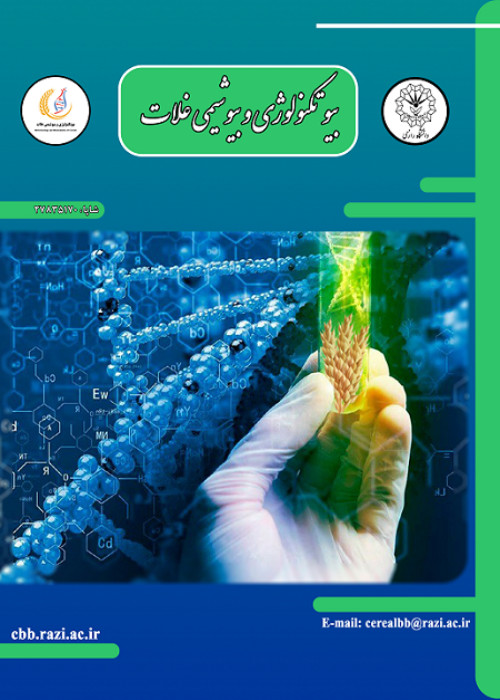Response of durum wheat mature embryo to callus induction and salt stress in vitro condition
Author(s):
Article Type:
Research/Original Article (دارای رتبه معتبر)
Abstract:
Introduction
Using plant tissue culture, including embryo culture, is one of the ways to increase genetic diversity to withstand environmental stresses, including salinity tolerance in plants.Materials and methods
In this study, the reaction of 20 different durum wheat (Triticum turgidum var. durum Desf.) genotypes, including improved lines, native accessions, and two control cultivars, Zardak and Saji, were evaluated to the induction of callus formation and plant regeneration through mature embryo culture and comparison of callus response to salt stress condition. Murashige and Skoog (MS) medium was used for the mature embryo culture of durum wheat. For assessment of genotypes to salt stress, growing morphogenic calli were exposed to different concentrations of NaCl (0, 4, 8, 12, 16 and 20 dSm-1) added to the culture medium. The response of genotypes to in vitro NaCl stress was analyzed as a 20 × 6 factorial experiment based on a completely randomized design with three replications. Comparison of genotypes for callus induction from mature embryos was based on callus induction frequency, relative fresh weight growth of callus (RFWG), relative growth rate (RGR) and callus growth rate. The relative fresh weight growth of callus (RFWG), relative growth rate (RGR), callus growth rate and necrosis percent of callus were used for salt stress.Results
The analysis of the correlation coefficients of the investigated traits in the conditions of callus induction showed that the callus induction percentage has a positive and significant correlation (P<0.01) with the callus growth rate. A positive and significant correlation (P<0.05) was also observed between the relative callus growth and the relative callus growth rate. Under salinity stress, relative callus growth showed a positive and significant correlation (P<0.01) with callus relative growth rate and a negative and significant correlation with callus chlorosis percentage. The results cluster analysis showed that genotypes 65-12-3-3, 75-5-3-5 and Zardak were classified in the same group of tolerant salt stress genotypes. Based on the results, Zardak variety and accessions 65-12-3-3 and 75-5-3-5 due to high relative growth rate and relative growth of callus and low chlorosis percentage in the saline environment were identified as tolerant genotypes to salinity under in vitro conditions. Genotype 25-25-1-5 had the highest response to adult embryo culture. The results showed a significant variation in the ability to callus induction in the genetic material under salinity stress conditions, which can be used in the durum wheat breeding program. It could be suggested to evaluate genotypes in field conditions and study the relationships between traits in vitro and in vivo.Conclusion
Selected cells and plants provide a tool to determine the mechanisms involved in salt stress tolerance. The laboratory screening method for tolerance to salinity stress of plant genotypes can provide a suitable path for developing salinity-tolerant lines in durum wheat.Keywords:
Language:
Persian
Published:
Journal of cereal Biotechnology and biochemistry, Volume:2 Issue: 2, 2023
Pages:
190 to 208
magiran.com/p2617079
دانلود و مطالعه متن این مقاله با یکی از روشهای زیر امکان پذیر است:
اشتراک شخصی
با عضویت و پرداخت آنلاین حق اشتراک یکساله به مبلغ 1,390,000ريال میتوانید 70 عنوان مطلب دانلود کنید!
اشتراک سازمانی
به کتابخانه دانشگاه یا محل کار خود پیشنهاد کنید تا اشتراک سازمانی این پایگاه را برای دسترسی نامحدود همه کاربران به متن مطالب تهیه نمایند!
توجه!
- حق عضویت دریافتی صرف حمایت از نشریات عضو و نگهداری، تکمیل و توسعه مگیران میشود.
- پرداخت حق اشتراک و دانلود مقالات اجازه بازنشر آن در سایر رسانههای چاپی و دیجیتال را به کاربر نمیدهد.
In order to view content subscription is required
Personal subscription
Subscribe magiran.com for 70 € euros via PayPal and download 70 articles during a year.
Organization subscription
Please contact us to subscribe your university or library for unlimited access!



